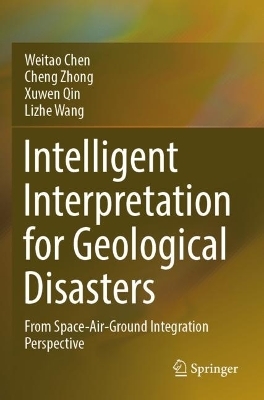
Intelligent Interpretation for Geological Disasters
Springer (Verlag)
978-981-99-5824-5 (ISBN)
- Titel nicht im Sortiment
- Artikel merken
This book comprehensively utilizes the new generation of artificial intelligence and remote sensing science and technology to systematically carry out researches on high-precision recognition, monitoring, analysis, and assessment of geological disasters by using different technologies of "ground, airspace, and space-based systems" and different scales of "target-semantic-region". The main contents include:
1) Intelligent interpretation theory and methods of geological disasters,
2) Intelligent analysis of landslide based on long-term ground monitoring data,
3) Intelligent analysis of landslide evolution based on optical satellite remote sensing data,
4) Deep learning-based remote sensing detection of landslide,5) Intelligent assessment methods of landslide susceptibility,
6) Intelligent recognition of ground figure based on airspace-based remote sensing data.
The book is of interest to graduate student, scientific, and technological personnel who work in the area of geological disasters, natural hazards, remote sensing, and artificial intelligence.
Dr. Weitao Chen (Member, IEEE) is a full professor at the School of Computer Science, China Univ. of Geosciences (CUG). He received M.E from in 2006 and Doctor from China Univ. of Geosciences in 2012. He has published more than 50 peer-reviewed technical papers in international journals. His main research interests include machine learning and remote sensing of geo-environment. Prof. Chen is a member of IEEE and served as editor board and reviewers of several international journals. He was awarded the land and resources science and Technology Progress Award (second prize in 2019), and the science and technology Award (second prize) of China command and control society (second prize in 2020). He was awarded "cradle plan" talent project of China University of Geosciences and the "Chenguang plan" talent project of Youth Science and technology in Wuhan, Hubei Province.
Dr. Cheng Zhong is an associate professor at the Badong National Observation and Research Station of Geohazards, China University of Geosciences (CUG). He received B.E. in geographical information system from Wuhan University in 2004 and Ph.D. in photogrammetry and remote sensing from Wuhan University in 2009. He has more than 10 years' experiences in remote sensing of geohazards with machine learning techniques. Funded by National Science Fund of China, Science and Technology Department of Wuhan City, he has published more than 30 peer-reviewed papers in known journals. He is the member of Geological Society of China, Seismological Society of Hubei, etc., and severed as a reviewer for tens of prestigious journals, awards, and funds.
Dr. Xuwen Qin is the researcher in China Geological Survey that has been awarded as "Li Siguang Scholar". He has been researching on the theory, technical equipment, and applications of remote sensing and physical detection in geological survey and has made breakthroughs in many key technologies. He also acquired many high-level achievements in the realm of terrestrial and deep-ocean geological hazards. Related works was collected in China Top 10 Science and Technology Development, selected by the members of the Chinese Academy of Sciences and the Chinese Academy of Engineering. In addition, he has acquired four 1st orizes and one 2nd prize at provincial level, published 16 monographs and 43 SCI academic papers, and has been awarded 12 international/national invention patents.
Dr. Lizhe Wang is a full professor at the School of Computer Science, China University of Geosciences (CUG). He received the B.E. and M.E. degrees from Tsinghua University, Beijing, China, and the Doctor of Eng. degree from University Karlsruhe (Magna Cum Laude), Germany. He is a ChuTian chair professor at the School of Computer Science, China University of Geosciences, Wuhan, China. His research interests include HPC, e-Science, and remote sensing image processing. Prof. Wang is a fellow of IET, IEEE, SPIE, and British Computer Society. He was awardedthe Land and Resources Science and Technology Progress Award (second prize in 2019) and the Science and Technology Award (second prize) of China command and control society (second prize in 2020). He was also awarded National Science Fund for Distinguished Young Scholars in 2019 and European Academy of Sciences in 2022.
Chapter 1. Geological disaster: An overview.- Chapter 2. Research methods of geological disasters.- Chapter 3. Principles and methods of intelligent interpretation of geological disasters.- Chapter 4. Intelligent analysis of multi-source long-term landslide ground monitoring data.- Chapter 5. Intelligent monitoring of landslides based on high-resolution optical remote sensing data.- Chapter 6. Deep learning-based remote sensing monitoring of landslide.- Chapter 7. Deep learning-based landslide susceptibility assessment.- Chapter 8. Deep learning-based intelligent recognition of ground fissures.- Chapter 9. Machine learning-based remote sensing monitoring of land subsidence in mining areas.- Chapter 10. Concluding remarks.
| Erscheinungsdatum | 26.11.2024 |
|---|---|
| Zusatzinfo | XII, 233 p. 85 illus., 79 illus. in color. |
| Verlagsort | Singapore |
| Sprache | englisch |
| Maße | 155 x 13 mm |
| Themenwelt | Naturwissenschaften ► Biologie ► Ökologie / Naturschutz |
| Naturwissenschaften ► Geowissenschaften | |
| Schlagworte | Deep learning • geological disaster • machine learning • Remote Sensing • semantic segmentation • target detection • Time Series Analysis • vulnerability assessment |
| ISBN-10 | 981-99-5824-5 / 9819958245 |
| ISBN-13 | 978-981-99-5824-5 / 9789819958245 |
| Zustand | Neuware |
| Haben Sie eine Frage zum Produkt? |
aus dem Bereich


